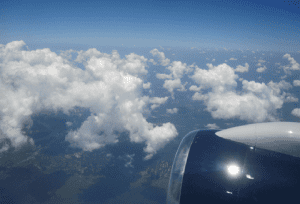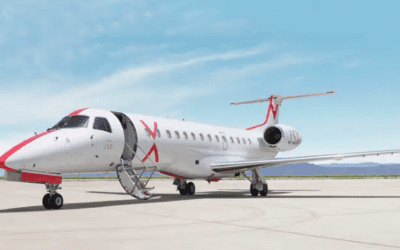An airline study calls for the elimination of travel uncertainty — wouldn’t that be nice.

Our take on travel uncertainty seems to have come together as the COVID-19 pandemic continued. Perhaps we can learn something from this time that will serve both airlines and consumers. That is the elimination of as much travel uncertainty as possible. In the introduction to his latest study, Advice to Airline Managers – Don’t Be Paralyzed, he notes:
The only consistency has been its inconsistency. It might be helpful to provide a summary of recent history to understand how we arrived here. The initial shock of Covid in the spring of 2020 prompted big action from the world’s airlines. Capacity was slashed and provisions were made to “batten down the hatches” in preparation for the severe traffic drop that very quickly arrived.
Bravo to the world’s airline industry for rapidly assembling an armada of protocols in hopes of restoring traveler confidence. Airplane interiors have never been cleaner and HEPA filtration saved the day.
Unfortunately, though consumers find rule simplicity and consistency comforting, the airlines do not believe that reality. Airlines thrive on consumer complications.
Throughout the pandemic, rather than working to make life less complicated and airline rules more consistent, airlines embraced the inconsistent. When I researched airline credit rules, only two airlines flying in the USA had consistent rules. To make matters worse, each airline approached issues like change fee elimination (depending on the type of airfare consumers purchased) and airline flight credits for flight cancellations because of the pandemic. Most have different rules for each airline.
Airlines treat airline credits as though cancellations directed by the Centers for Disease Control (CDC) or the President were selected by consumers for their convenience. Many cancellations of flights during the pandemic happened because of pleadings from our health officials and scientists. There was no consistency.
Even the Department of Transportation failed passengers who by international rules could not travel but whose flight made the trip anyway based on federal regulations. I know no traveler who decided to cancel a trip because they did not want to travel. Many could not travel because they were sick. (Airlines and the DOT never enacted any rule that allowed passengers with COVID to cancel trips.) Or, over holidays when our leaders and the CDC asked Americans not to have family gatherings because of the danger posed by COVID.
Consumers faced a problem — fly and catch a deadly disease or cancel and be at the mercy of inconsistent airline flight credit rules.
Mr. Sorensen, in a chart of “Covid Era Change and Cancellation Policy Survey,” displays the miserable state of today’s consumer protections. The chart shows no travel consistency in airline rules. Plus, these rules are only a snapshot in time. Credit expiration dates are not predicated on pandemic conditions or any rule simplicity. As the airline analyst created this chart, we discussed his frustration. He noted in the study:
Is the industry making continuing good effort here? In a word – no. The columns describing the existence of fee waivers should universally display an affirmative response. The columns describing policy expiration dates should display dates well beyond the Northern Hemisphere’s summer season – such as 31 December 2022. Rather, the industry’s promise of flexibility during the pandemic is now a hodgepodge of short windows of protection. Consumers are not blind to this and thus don’t feel assured and confident. The airline industry, and the travel industry overall, have largely failed to meet a basic human need for financial security.
Airfare complexity is highlighted in the IdeaWorks study.
The words of the study are damning.
It is stunning how complex the airline industry has made the purchase of airline tickets. The purchase of a $78 ticket for travel between Los Angeles and Las Vegas is ultimately governed by a 12,000-word contract, whereas buying a $1 million home requires a scant 2,000 words. Airline contracts are beyond the understanding of any sentient being.
After decades of this behavior, it’s difficult to believe it’s unintentional. But if intentional, for what purpose? Why upset your customers and frustrate your call center and airport staff? Why degrade your brand? Giving the industry the benefit of doubt suggests the reason is simple sloppiness and the residue of years-upon-years of policy additions without the benefit of a good clean-up. Creating the full-page table displayed earlier in this report was a labor-intensive and frustrating task undertaken by someone who has been in the airline business for 38 years. Pity the poor consumer who is not a legal scholar or nuclear physicist.
When airlines decide that travel uncertainty works against their business, the consumer pandemic experience should be consistent.
The first steps away from travel uncertainty may come from the Department of Transportation (DOT). Otherwise, having airlines present identical rules for change fees and flight credits issued during the COVID pandemic may be considered an antitrust issue. That is the rationale many airlines use. During the pandemic and now at the end of the pandemic, DOT should require all airlines to have consistent rules for flight changes and pandemic cancellations.
Cancellations should result in airline flight credits that never expire. These credits are the consumer’s money, after all. Plus, all rules must exhibit consistency. As we exit the pandemic, all passenger rules dealing with cancellations caused by airlines or government mandates must be consistent across all airlines.
The rebound of airline flights required travel consistency. Any travel uncertainty regarding pandemic change fees and airline flight credits should be consistent and understandable for the ordinary airline consumer.
READ ALSO:
Between COVID and the Ukraine war, what will happen to future travel?
How US embassy emergency services can help Americans traveling internationally

Charlie Leocha is the President of Travelers United. He has been working in Washington, DC, for the past 14 years with Congress, the Department of Transportation, and industry stakeholders on travel issues. He was the first consumer representative to the Advisory Committee for Aviation Consumer Protections appointed by the Secretary of Transportation from 2012 through 2018.



